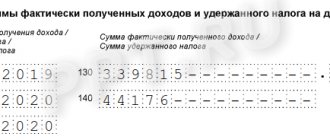Home / Labor Law / Payment and benefits / Wages
Back
Published: 05/28/2020
Reading time: 6 min
2
445
- Good afternoon. The employer offered me to pay part of my salary in the form of a salary officially on a card, and the other part - monthly in an envelope. This will supposedly be beneficial for both me and him. Is it worth agreeing to this? Is this really beneficial for the employee and what risks need to be taken into account? And what responsibility is provided for the employee and the employer for receiving a gray salary?
- What is “gray salary”
- Responsibility for the employer Tax consequences
- Criminal liability
- Tax
Dear readers! To solve your problem, call hotline 8 or ask a question on the website. It's free.
Ask a Question
Where to complain about black wages?
It is easy to calculate that, for example, with an official salary of 50 thousand, the employee will receive 43.5 thousand, while it will cost the employer 63 thousand. It is not surprising that concealing the true size of wage payments is very beneficial for the employer, since it can significantly reduce costs. For an employee, a white salary guarantees that all points of the Labor Code will be fully complied with:
- duration of vacation;
- payment of vacation and sick leave;
- correct calculation upon dismissal, etc.
Gray With gray (semi-official) wages, its size is negotiated between the employer and employee orally, only part of it is reflected in payrolls, and the rest is issued separately. Thus, the gray salary consists of 2 parts: white (specified in the employment contract) and black (unofficial).
What it is?
Gray salary is payments that consist of two unequal parts:
- The smaller of them is usually paid in the form of a white salary. This means that all necessary accruals are debited from it.
- The majority is given to the employee in the form of cash, just like cash.
Basically, this way of earning money can be obtained by working for a representative of a medium or small business. This is a great way for them to evade paying part of their taxes.
Most often, you can get to such an employer when looking for work in such areas as:
- construction;
- various areas of trade;
- manufacturing industries.
https://youtu.be/ehwWp3X5SnQ
What is gray wages and how does it threaten the employer?
It is in this codified act that it is determined that employees receive money in the amount established in the employment agreement concluded between them and the employer. This amount is also indicated in the employment order and accounting documents.
Gray salaries are beneficial not only to employers, but in some cases to employees:
- The amount of personal income tax is reduced because it is deducted only from the official part of the salary.
- The amount of some other deductions, such as alimony, is reduced.
The accrual of sick leave, vacation pay, as well as calculations for possible dismissal depend entirely on the position of the employer. Sometimes an oral agreement is concluded between the employer and the employee that all such accruals will be made from the true amount of the salary, and the employer keeps his word.
However, when hiring, employers often immediately confront the applicant with the fact that vacation pay, compensation for unused vacation upon dismissal, severance pay, etc. will be calculated from the official salary, i.e., its “white” part, and the employee has to agree with this. In this case, it will be possible to get rid of some types of taxes. But we must immediately make a reservation that not all employees can be provided with this form of income.
Another popular method is to pay the bulk of your earnings in the form of compensation for withholding wages. But it is worth clarifying that, according to the law, the amount of such payments is not subject to taxes and is equal to 1/300 of the refinancing, or the employer can assign it independently.
Unscrupulous managers take advantage of this by prescribing large amounts of compensation in local regulations and employment contracts.
- But even when using such seemingly legal schemes, employees are still exposed to risks. To protect employees as much as possible, the employer can enter into a civil contract with them.
Black salary
They are conventionally divided into 3 types:
What to do if they don’t pay black wages and where to go?
But not all employers adhere to this requirement. Multicolored salary Such names as white, gray and black salary have probably been heard by everyone.
Different wage colors are used to indicate illegal payments. Let's take a closer look at what it is. White According to the law, there is only an official salary, which is also white. The amount of official remuneration is established by the employer himself and is recorded in the relevant documents. However, in accordance with the Labor Code of the Russian Federation, there are two mandatory conditions:
- Wages should not be lower than the level established by law.
- Its payment must be made 2 times a month.
The white salary in full passes through the entire document flow and is indicated:
- in the employment order;
- in the employment contract;
- in accounting documents, etc.
The consequences of receiving a gray salary
This is due to the fact that the amount of income tax is withheld from the salary by the employer, who acts as a tax agent. When receiving wages in cash, the employee assumes that this deduction has already been made by the employer and the tax has been paid.
At the same time, the employee is deprived of the opportunity to check whether the employer has made the statutory contributions or not. You can report black wages to the following authorities:
- State Labor Inspectorate;
- Prosecutor's Office;
- Tax Inspectorate.
State Labor Inspectorate The State Labor Inspectorate is a body authorized to protect the rights and legitimate interests of workers.
Where can I complain about a “gray” salary?
Also, the head and chief accountant of an organization may be charged with an article of the Criminal Code of the Russian Federation for large-scale tax evasion, if the amount of unpaid taxes for three financial years ranged from 500 to 2,500 thousand rubles. If the tax inspectorate has evidence of the payment of “salaries in envelopes,” this will not go unnoticed, since the question naturally arises from what income it is paid.
This means that the accounting department did not reflect the transaction from which this income was received. According to experts, it is difficult to change anything in the situation with gray and black wages as long as only employers face fines.
The employer himself withholds personal income tax from wages, since he is the tax agent. This means that personal income tax should already be withheld from the amount that the employee receives in cash, and the employee does not violate the law.
How does the Federal Tax Service calculate such payers?
Fiscal authorities are not staffed by robots, but by ordinary citizens who are familiar with the labor market, represent average wages in a particular field, and from time to time visit job search sites. If one amount is indicated on the notice board ( Avito, Zarplata.ru, Job or others ), and the company submits reporting documents to the Tax Office for a different amount, then this difference will then raise questions from tax officers.
After dismissal, an unjustifiably disadvantaged employee himself may well go to the Federal Tax Service and write a statement denouncing the employer about the payment of a gray salary in his office.
When monitoring social networks and review sites, the taxman will find a lot of indignation from citizens about companies where they pay wages in an envelope. There would be a desire and time to do this. All the information is on the surface, just open and read, schedule checks.
Learn important things: How to prove illegal wages
The tax office has the right to call for a conversation people who write reviews of a negligent company, to find out what is happening in the company and this will be another reason to order an audit.
It is not difficult to identify the payer of gray wages; it takes time, the desire of the tax officer to do this and requests from the outside (complaints, appeals, calls, denunciations). The other side of the coin is that many workers benefit from receiving unaccounted wages. The problem of small business and the conditions that government agencies have created for it.
Anonymously complain about a gray salary
You can write a complaint to the prosecutor's office using the following sample: Application to the prosecutor's office about black wages Sample application to the tax office: Application to the tax office Where can I report anonymously? An anonymous appeal can be sent by mail to the address of all of the above authorities that exercise control over employers in tax matters. The tax office premises have publicly accessible boxes for receiving applications from citizens.
You can send them a complaint describing the employer’s unlawful actions. Understanding the complexity of the situation, tax inspectors will most likely analyze the information sent to them for attention and take action. To the court If a conflict situation arises, an employee can try through the courts to prove the true amount of his wages, including those received in an envelope.
When does the tax office become interested?
A number of supervisory government agencies are fighting the shadowing of the labor sector. The organization comes under scrutiny, which means inspections are carried out on several occasions. Among them:
- the declared salary level for employees with a certain qualification is lower than in a given industry or region;
- accounting documentation showed that management received less compensation than ordinary employees;
- employees move from higher paid positions to the specified organization at a lower rate;
- employees indicating a salary level higher than that stated in their employment contracts, for example, when lending;
- there are signals about the presence of gray or black circuits.
Read also: Signs of business fragmentation
The latter case means the presence of a complaint from employees, other persons, as well as an anonymous appeal.
It is worth considering that if there are lawsuits and a former employee appeals to the authorities, an inspection will be scheduled automatically, that is, the company will be taken under supervision, which will not allow it to avoid periodic inspections in the future.
Is it possible to anonymously complain about a gray salary?
The reason for the inspection may be a complaint from an employee of the organization. Based on the results of such an audit, a decision may be made to bring the employer to administrative liability with the imposition of a significant fine. Before filing a complaint with the tax authority, you should collect all possible evidence confirming the fact that the employer committed violations.
You should contact the tax authority at the location of the organization. You can file a complaint against your employer either in writing or orally.
To complain verbally, you can call the special phone number listed on the Federal Tax Service website and provide information regarding the illegal payment of wages.
The day before, we talked about an employee’s plans to take revenge on his employer. Today is a story from an employer who felt the righteous anger of a former employee.
An individual entrepreneur contacted our forum who wants to prepare for possible inspections due to gray wages.
please help me with advice, I have a 6% individual entrepreneur, 25 people work as wireline workers... official salary is 10 thousand rubles (in the region).. it’s more clear on hand. in principle, no questions arose from any of the authorities.. but alas, a scrape arose with a former relative who worked in 2015.. he wrote a complaint about the salary in an “envelope” either to the prosecutor’s office.. or to the Federal Tax Service.. haven’t found out yet .. employees are ready to confirm that they received 10 thousand. because They didn’t take income tax from them either.. what are the dangers of this and how can an inspection be carried out? For what period can they check? only 2020..2016..2017 (for example, away, if that) or can they take over 2014?
You can join the discussion in the forum topic “The IP worker’s salary is in an envelope.”
Word of the law
The procedure for paying an employee is regulated by the Labor Code of the Russian Federation.
It is in this codified act that it is determined that employees receive money in the amount established in the employment agreement concluded between them and the employer.
This amount is also indicated in the employment order and accounting documents.
According to tax legislation, personal income tax is collected from official wages, and the unified social tax is also paid.
Concept
The concept of “gray salary” is not disclosed in regulations.
In practice, this term refers to the following remuneration scheme:
- the white part is the official salary, which is indicated in the necessary documents, from which PFDL and UST are paid;
- the black part is the unofficial one, which the employee actually receives in addition to the white one.
Normative base
The regulatory framework on this issue is represented by two codified acts - the Labor Code of the Russian Federation and the Tax Code of the Russian Federation.
These regulations define the procedure for payment and approval of wages, as well as their taxation.
The Tax Code of the Russian Federation establishes the employer's responsibility for paying taxes not in full. If the amount of damage is significant, this may lead to criminal liability.
How is it convenient?
A gray salary is convenient, first of all, for the employer. It saves significantly on insurance premiums. Due to available funds, it becomes possible to attract more valuable personnel.
But an unscrupulous employer uses this scheme to put pressure on employees. In case of conflicts, the employee receives the minimum white part of his salary.
Difference from “white” and “black” schemes
Under the white scheme, the full amount of remuneration is indicated in the employment contract, accounting documents, etc. The employer deducts insurance premiums and taxes from this money.
The black scheme does not involve dividing the amount of wages into two parts - white and black; all of it is paid unofficially and is not documented anywhere. In such cases, employment contracts are not concluded with employees and, accordingly, pension and insurance contributions are not paid.
Under the gray scheme, wages are most often equal to the minimum wage, and everything above this amount is paid “in an envelope” and is not reflected in any documents of the organization.
Advantages and disadvantages
This scheme has its pros and cons.
So, with a gray remuneration scheme, the employee:
- is partially protected from the actions of an unscrupulous employer;
- since he does not receive a full salary, he cannot count on a decent pension in the future;
- if he goes on sick leave or is fired, he will receive appropriate payments, but in a minimal amount; the remaining amount will be reimbursed only at the will of the employer; the employee will not be able to claim more.
In addition, there is a high probability that the bank will refuse to provide a loan due to low white wages.
Maternity and child care benefits are calculated based on the amount of wages for the last two years.
If the employee received her salary “in an envelope,” then only the official part, that is, the white part, will be taken into account in the calculations, and they will be minimal.
The employer may refuse to reimburse the remaining funds and the woman will not be able to prove her case.
It is beneficial for the employer to use the gray scheme to save on employee contributions.
But such illegal actions can lead to liability, including criminal liability.
Existing schemes
There are two semi-legal schemes. They are not often used in practice, since tax authorities are already aware of them and are especially vigilant towards such organizations during audits.
So, employers can use compensation for the occurrence of wage arrears. The law stipulates its minimum size. The employee and employer establish a higher percentage of compensation in the employment agreement.
Employees' wages are delayed and paid along with compensation. The latter is not subject to unified social tax and personal income tax.
Responsibility of the parties
Payment of unofficial wages threatens punishment both for the company employee, as well as for the company’s management and the legal entity as a whole.
For employee
You can be held responsible for receiving unofficial wages only if the following conditions are met:
- If an individual knows that the company administration does not withhold personal income tax and does not make contributions to the funds. The responsibility for withholding income income and calculating contributions rests entirely with the company administration. Therefore, if a person receives a salary from which personal income tax has been deducted, he may not even know that the employer is paying him a black salary. In this case, the person is not at fault.
- There is evidence of an agreement between an individual and the management of a company on the payment of black wages, as well as non-payment of personal income tax and insurance premiums.
It is possible to exclude the employee’s guilt for receiving a black salary if he sends the 3NDFL form to the Federal Tax Service by April 30, indicating the amounts of income, and calculates and pays the personal income tax amounts by July 15.
Otherwise, when he is paid a gray salary, the employee becomes liable, which will include the calculation of penalties in the amount of 1/300 of the rate of the Central Bank of the Russian Federation for each period of delay in tax payment and the accrual of a fine in the amount of 5% for each month of non-payment of tax, but not more than 30%. from the amount of tax debt.
Attention! The employee may be subject to liability under the Criminal Code of the Russian Federation. It appears if the amount of non-payment of personal income tax for three years exceeds 600,000 rubles. The employee is subject to a fine in the amount of 100,000-300,000 rubles or forced labor for one year, or imprisonment for the same period.
For the employer
When a gray salary is paid, the employer's responsibility is represented by:
- The liability established by the Code of Administrative Offenses involves imposing penalties on company officials for violations of accounting and reporting rules in the amount of a fine of 5,000 to 10,000 rubles. For repeated cases, the amount of the penalty can now be fined 10,000-20,000 rubles. Possible disqualification for 1-2 years.
- When there is a salary in an envelope, the employer’s responsibility, according to the article of the Criminal Code of the Russian Federation, is represented by a fine in the amount of 20% of the amounts of personal income tax and insurance contributions not paid to the budget.
- It also provides for criminal liability of officials of a legal entity for this offense in the amount of 100,000-200,000 rubles, which can be increased to 500,000 rubles. It also provides for forced labor for up to two years, administrative arrest for six months, and imprisonment for 2 years.
In addition to the employer, the employee himself is also responsible for the gray type of remuneration.
This is due to the fact that, by law, the funds received are required to be declared and the necessary amounts and deductions made. You can even do this yourself. There are two deadlines for this. Declaration for the past year is made until April 30, and payment is made until July 15 of the year following the reporting period. https://youtu.be/r3pxIKQU56c
In the absence of this process, liability arises, which is provided for in Article 228 of the Tax Code of the Russian Federation. In accordance with the law, paying personal income tax is the responsibility of an individual.
Violation means the possible imposition of a fine equal to 5% of non-payment for each month with a limit of 30% and an amount of at least 1000 rubles. However, the outstanding amount will still need to be paid. In the event of a repeated violation or a large violation, liability passes into the scope of criminal punishment. It manifests itself:
- in a fine with a limit of 100,000-500,000 rubles;
- in a fine equal to salary or similar income for a period of 1-3 years;
- arrest - 4-6 months;
- detention with a limit of 3 years.
The legislation establishes that the gray type of salary corresponds to evasion of mandatory contributions, which leads to corresponding penalties.
A company that uses an established version of wage-related schemes must take into account that this fact will be revealed when checking the documentation by supervisory authorities, which will lead to sanctions.
Responsibility:
- According to Article 122 of the Tax Code of the Russian Federation, underestimation of the tax base or incorrect calculations lead to a fine equal to 1/5 of the amount of non-payment. At the same time, a fine will be imposed even in case of simple inaction of management, that is, an unintentional violation:
- intentional violation carries double the fine;
- all unpaid funds are recovered in full;
- the manager will be summoned to a special commission, and the organization will be examined financially by an on-site audit, which will check not only wages, but also other processes related to accounting and production;
- According to Article 199 of the Criminal Code of the Russian Federation, if tax returns or similar documents are not submitted or submitted in a false form, a fine is imposed, which varies between 100,000-300,000 rubles. It is worth considering that the perpetrator of the violation is fined his annual income for a period of up to 3 years, is deprived of the rights to certain activities or positions, and is also sentenced to forced labor for up to 2 years. Another punishment option for a malicious violation is arrest for up to 6 months or imprisonment for a maximum of 2 years.
It is important to remember that group conspiracy and fraud, as well as the large size of the violation, lead to an increase in the fine to 500,000 rubles. In this case, the term of forced labor is increased to 5 years, activities are limited to 3 years, and deprivation of liberty can be for a maximum of 6 years.
What to do if you are paid a gray salary?
We have already said that paying gray wages can be extremely unprofitable for the employee.
What to do if the employer does not want to pay your work according to the white scheme? It is necessary to collect evidence and contact the supervisory authority.
Where to complain?
You can apply for payment of gray wages to one of the following authorities:
- Labour Inspectorate;
- tax office;
- prosecutor's office;
- court.
To the prosecutor's office
When contacting the prosecutor's office, you must prepare a complaint. It is compiled in free form.
It is necessary to indicate the fact of payment of wages “in envelopes”. Such a complaint must be accompanied by copies of the evidence that the applicant has.
Example document:
Standard application form to the prosecutor's office
To the tax office
You can prepare approximately the same appeal to the tax office as to the prosecutor's office. It is also compiled in free form.
You can prepare a collective appeal on behalf of all employees.
Example:
What are the disadvantages of time-based wages? See here.
How is a civil servant's salary determined? Read here.
Where can I report anonymously?
A complaint against an employer to supervisory authorities will lead to a deterioration in the relationship between him and the employee.
Many people want to avoid such consequences by sending anonymous complaints to supervisory authorities.
They are taken into account, but are not always accompanied by the expected result.
To court
When going to court, you must prepare a statement of claim.
It must reflect the following points:
- the amount of debt;
- requirement to collect interest on late paid funds;
- requirement to indicate in official documents the real amount of remuneration.
How to prove a fact in court?
When proving the fact of payment of wages under the gray scheme, the following evidence can be used:
- vacancy announcements that were posted on the Internet or in print (if they indicate the salary);
- information from the State Statistics Committee on the average salary for a given profession in the relevant region;
- salary certificates, which are sometimes provided by the accounting department at the request of the employee - for example, for a bank;
- testimony of witnesses, who may be work colleagues;
- audio and video files;
- statements of issue and accrual of wages.
Where to complain
If a conflict situation arises with the management of the company, it will be very difficult to achieve payment in the event of dismissal based on the actual salary paid. This can only be achieved through the courts.
Of course, you can try to solve the problem peacefully. It will be necessary to send the employer a written notice of failure to fulfill obligations and possible recourse to court. But, as a rule, the organization’s administration is convinced that the employee is unlikely to resort to legal proceedings. And not everyone can prove the guilt of management.
But at the same time, it remains possible to contact the Federal Tax Service or the labor inspectorate. They pay very close attention to information about tax evasion and violation of employee rights.
But this does not always bring the desired result.
it is quite possible to prove the payment of “gray” wages in court without involving a lawyer. This will require the presentation of substantial evidence during the process.
It can be:
· Certificates in form 2-NDFL, issued earlier, the information in which differs from that indicated in the salary statement:
· Testimony of witnesses;
· Video shooting or photography;
· Any documentation confirming the funds actually issued.
Existing judicial practice confirms that to prove the employer’s guilt when posting vacancies where a higher income is indicated than shown in the statement, or a discrepancy between the position and remuneration.
Learn important things: How to become self-employed – Instructions 2020
In this case, both the employee and the tax inspectorate can make claims. To initiate an inspection, the employee will need to file a complaint with the labor inspectorate. He can also attach a request for non-disclosure of personal data to a third party and then the company management will not know on whose initiative the verification activities are being carried out.
You can contact the regional office of the Labor Inspectorate of the locality by calling or making an appointment. You can also leave a complaint on the Rostrud service portal.
ATTENTION! Before submitting an application, you need to fully compensate the resulting personal income tax debt, because the liability in this case will affect not only the employer, but also the employee.
In addition, you can file a complaint with the tax authorities or the prosecutor's office. The procedure for contacting all authorities is identical. You will need to send a written appeal, attaching evidence on this fact. The letter can be sent by post, submitted in person, or the application can be made by telephone.
IMPORTANT! The response is sent to the applicant within 30 days from the date of registration of the statement of infringement of rights. But first, a check must be carried out on the stated facts and a conclusion must be prepared.












